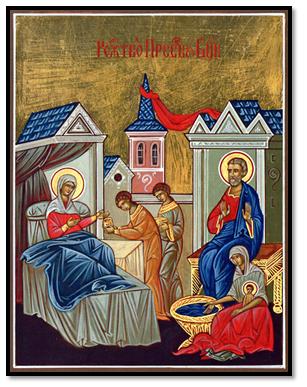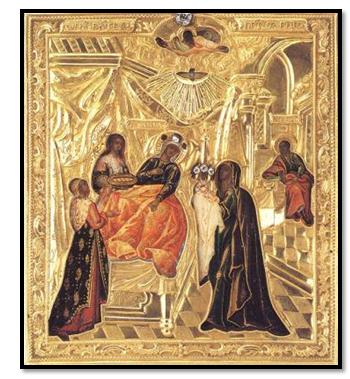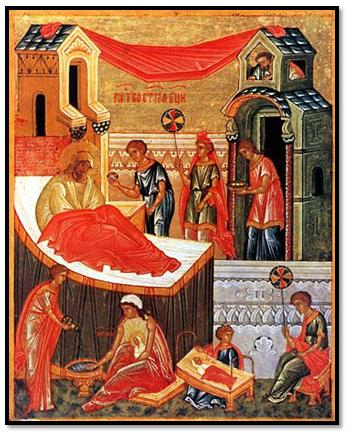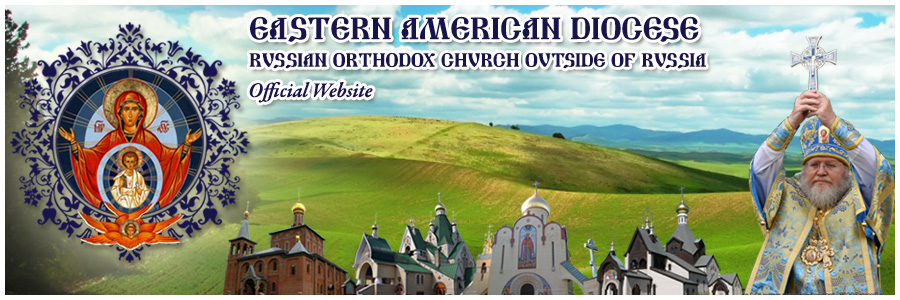Русская
Версия
The Most
Glorious Nativity of the Mother Of God
 “Today
She is born from the chaste Joachim and Anna, and Adam’s curse upon us
is destroyed by Her birth” (stichera
for the Vigil).
“Today
She is born from the chaste Joachim and Anna, and Adam’s curse upon us
is destroyed by Her birth” (stichera
for the Vigil).
For
five-and-a-half thousand years mankind subconsciously awaited this
moment. All that while it could not find in its midst a maiden worthy of
becoming the Mother of God incarnate; humanity was unable to produce a
Chosen One Who could contain within Herself the Uncontainable.
All spiritual
things were foreign to antediluvian mankind. In those days people were
so incorrigibly flesh-bound that God eradicated them from the face of
the earth in the waters of the deluge and planted a new mankind from the
roots of righteous Noah. But Adam’s new progeny did not remember for
long the reasons for the deluge and began anew to build a monument to
its pride. Then the Lord dispersed the people upon the entire face of
the earth, dividing them one from another by a language barrier.
Afterwards He
found a shoot of future salvation – Abraham, and planted him in
fertile ground, grew a mighty tree from him – the people of Israel,
guarded them, cleansed them of idolatry, and finally focused all His
attention and concern upon one of its branches – the tribe of Judah,
and then concentrated upon a small offshoot – the ancestry of David,
which gave the world the everlasting Bloom – the Most-pure Virgin.
Such was the divine plan for our salvation – from a dying root to
produce a bloom of incorruptibility, chosen from among all ages and
people – the Most-blessed Virgin Mary.
This wondrous
event took place in a small town in Palestine called Nazareth, where an
elderly barren couple gave birth to a Daughter. For many of their
neighbors this appeared extraordinary, but not more than that. They were
unable to comprehend the magnitude of the event. Had their spiritual
eyes been open, they would have seen a wondrous sight: the Son of God
attending the birth of the Holy Virgin; angels reverently surrounding
the newborn Maiden, greater than the cherubim and higher than the
seraphim; Adam and Eve spiritually triumphant, seeing the ancient
prophecy coming to pass – the birth of a Maiden Whose seed would
destroy the head of the ancient serpent (Gen. 3:15). Repentant sinners
rejoice, for into the fallen world has come the Surety of sinners, the
Intercessor for the damned, the Joy of all who sorrow.
The Mother of
God loves and hears all those who pray to Her in the simplicity of their
hearts, for “through the doors of Her mercy everyone enters freely
with prayer” (St. Dimitri of Rostov).
Let us not
pass by this door, dear brethren, by forgetting to pray, and let us not
thus send away, as did antediluvian mankind, the Merciful Intercessor
from our midst.
Reprinted
from “Orthodox Russia,” No. 17, 2001
THE RIGHT
TIME
Homily for the Nativity of the Holy Theotokos
 In the
service for the feast of the Nativity of the Holy Theotokos there are
the following words: “In the sorrow of their barrenness, the wise
parents of the Mother of God cried out unto the Lord, and they gave
birth to Her unto all generations, for universal salvation and glory.”
In the
service for the feast of the Nativity of the Holy Theotokos there are
the following words: “In the sorrow of their barrenness, the wise
parents of the Mother of God cried out unto the Lord, and they gave
birth to Her unto all generations, for universal salvation and glory.”
Let us ponder
this moment, my dear brethren. We see before us the righteous Joachim
and Anna - venerable and pious, faithful spouses, issuing from an
ancestry of kings and priests, God-fearing, keeping all God’s
commandments, known for their humility and charity. And yet this model
couple is the object of scorn and humiliation on the part of their
neighbors! How can that be? It is because the years go by and by, and
they have already reached old age, and still the Lord has not given them
any children.
In those
times every Jew hoped, through his descendants, to participate in the
kingdom of the Messiah. Therefore, every Jew who was childless was
scorned by others, because barrenness was considered to be God’s great
punishment for sins.
This was
especially hard for Joachim to endure, being a descendant of King David
and knowing that Christ the Saviour was to be born of his ancestry. And
so what do the righteous Joachim and Anna do? Despite being mocked by
others for so many years, they do not grumble against the Lord, they do
not abandon their virtuous life, but humbly continue to endure, to
endure and hope, to hope and - despite their very old age - to have
faith in God’s mercy. As the church hymn tells us, in the sorrow of
their barrenness they cry out unto the Lord, i.e. they tearfully pray to
him.
And what is
the result of this humility, patience, faith, hope and prayer? Once
again we receive the answer in the church hymn: they, the wise parents,
receive a heavenly gift from God - the One Who is higher than the
cherubim, Who is birth-giver to God the Word, - and they give birth to
Her unto all generations, for universal salvation and glory.
Such is the
extraordinary gift earned by the righteous Joachim and Anna - they give
birth to the Mother of God, the Holy Virgin Mary, and in Her nativity
they themselves are glorified for all ages!
But why did
they have to wait so long? The Lord was not punishing them for their
sins - they were already righteous and pure; the Lord was not testing
their patience and humility - they had already exhibited these virtues
abundantly. No, dear brethren, they had to wait for so long until the
time was right. Herein lies the key - they had to wait until the
time was right.
The Holy
Virgin, as the future Mother of God, had to be the purest vessel
possible in humanity. Because of this She had to come from the purest
parents possible: for this reason the righteous Joachim and Anna had to
wait until they were purified of all human passions by means of
humility, patience and old age. And then, when the right time came, they
- who had so meekly accepted God’s will and the fate which the Lord
had meted out to them - now received such wondrous comfort.
Does not the
same happen in our lives, dear brethren? We often find ourselves in a
state of spiritual barrenness: we are subjected to sorrows and
hardships, and we pray to God without apparently receiving any comfort,
or we ask for the fulfillment of some spiritually-beneficial wish - and
it is not fulfilled. And so we begin to think that this is punishment
for our sins - and we fall into despair, we begin to lose hope, we even
begin to grumble against the Lord.
No, dear
brethren! The Lord often tarries with the fulfillment of our wishes not
because He does not hear our prayers or punishes us for our sins, but
because the right time has not yet come. We do not know
God’s will for us, while the Lord sees our entire life, knows what we
need and when we need it, knows what is best for us and when.
Therefore,
let us follow the example of the righteous Joachim and Anna: let us
patiently wait and patiently pray, let us meekly accept the will of God,
let us have absolute hope of God’s mercy and absolute faith in His
providence, let us have faith in that the Lord hears all our prayers,
all our cries, sees all our sorrows, knows all our needs, and that He
will send us what we need when we need it.
Amen.
Father Rostislav Sheniloff
 When a king
plans to live in a certain city or settlement, an appropriate dwelling
is prepared for him there in advance; in like manner the Heavenly
King, before coming down to earth, prepared for Himself a wondrous
palace, not made by hands, in the person of the Most-immaculate Virgin
Mary. And if we, when looking at notable sights, focus our attention
on the beautiful architecture of palaces and various monuments, then
with how great a piety and awe should we not bow down before the
living House of God?
When a king
plans to live in a certain city or settlement, an appropriate dwelling
is prepared for him there in advance; in like manner the Heavenly
King, before coming down to earth, prepared for Himself a wondrous
palace, not made by hands, in the person of the Most-immaculate Virgin
Mary. And if we, when looking at notable sights, focus our attention
on the beautiful architecture of palaces and various monuments, then
with how great a piety and awe should we not bow down before the
living House of God?
Today the
Church prayerfully commemorates the Nativity of the Virgin Mary, the
most blessed among women, Who has so wondrously served the mystery of
the incarnation of God the Word. Her parents, the righteous Joachim
and Anna, came from families of kings and high priests, but lived in
obscurity. Being distinguished by high morality, they were at the same
deeply unhappy, since they had lived until a very old age without
having children, which at that time was regarded as severe punishment
from God. This was because every Jew of those times ardently wished
for the awaited Christ to come from his family or at least from his
descendants. This meant that whoever had no children was deprived of
such a hope. Joachim and Anna often earnestly prayed to God to remove
from them such a disgrace in the eyes of the Jews, but the Lord
tarried in fulfilling their request because the time was not yet ripe.
It seemed to them that all hope was already lost, but what is
impossible for man is possible for God. God’s Providence once again
raised their hopes especially strongly. During the feast of the
renewal of the temple, St. Joachim came to Jerusalem with his servants
and wished to offer a rich sacrifice, but the priest did not accept
it, indicating that Joachim was unworthy because of his childlessness,
while another Jew expressed his contempt for Joachim in front of
everyone. The childless father’s cup of sorrow overflowed. He let
his servants go back home, while he himself went off into the desert
and spent 40 days there in fasting and prayer. “Lord, – he cried
out, shedding copious and bitter tears, – deliver me from the
disgrace of childlessness, and if by Thy blessing my wife should give
birth to a child, I will dedicate it to Thy service.” At the same
time St. Anna, having learned from the servants of what had happened
to her husband in Jerusalem, refused to be comforted and tearfully
increased her prayers, acknowledging herself to be a sinner and
unworthy of God’s mercy. Being unable to find peace anywhere, she
went out into her garden and in one of the trees saw a nest with
fledglings. “My God, my God! – she said tearfully and sorrowfully,
– even the birds of heaven are more fortunate than I, for they have
offspring, while I am lower than dumb creatures…” At this her
trial ended. An angel suddenly appeared to her and said: “Anna, fear
not, thy supplication has been heard, thou shalt conceive and give
birth to a Daughter Who shall be the most blessed of all.” Who can
describe the joy of the previously unfortunate woman? She immediately
hurried off to Jerusalem, in order to give praise and thanks to God in
the temple. The same angel also appeared to righteous Joachim and
announced to him that a Daughter, Whom he should call Mary, would be
born to him, and in confirmation of the truth of his words the angel
said: “Hurry to Jerusalem and there thou wilt meet thy wife Anna at
the city gates.” In truth everything came to pass as was foretold.
The overjoyed couple offered a sacrifice to God, which the priest
accepted very readily this time, and afterwards returned home, where a
Daughter was born to them and was called Mary.
So you see,
dear brethren, that even people who are righteous from childhood do
not always get what they ask for right away. Sometimes many years pass
before the Lord responds to the supplication of His servants. One
thing remains without doubt – that never does our sincere
supplcation slip by the All-seeing God. For this reason Christ teaches
us: ask and ye shall receive. He did not mean “ask once,” but
rather “keep on asking,” perhaps for a long time, persistently,
earnestly, and above all – with faith in God’s mercy. However, it
is not forbidden to ask for an acceleration of celestial help, but we
should always remember that the Lord governs His own paths and, if
necessary, fulfills our entreaties in their own good time, as occurred
with the nativity of the Most-immaculate Virgin Mary. Amen.
Protopriest
Leonid Koltsov
Reproduced
from the website of
Holy Transfiguration Church in Baltimore
www.holy-transfiguration.org


